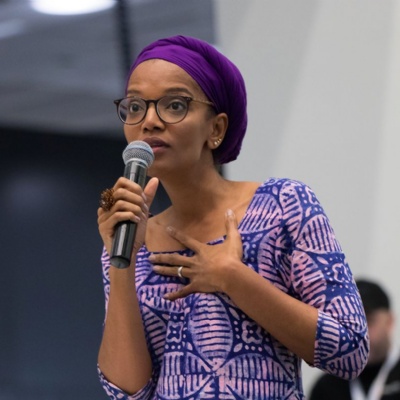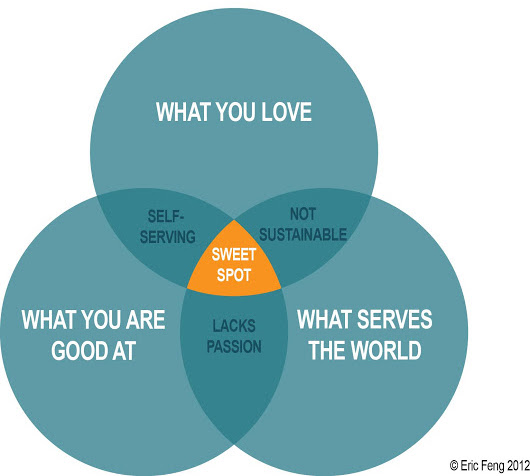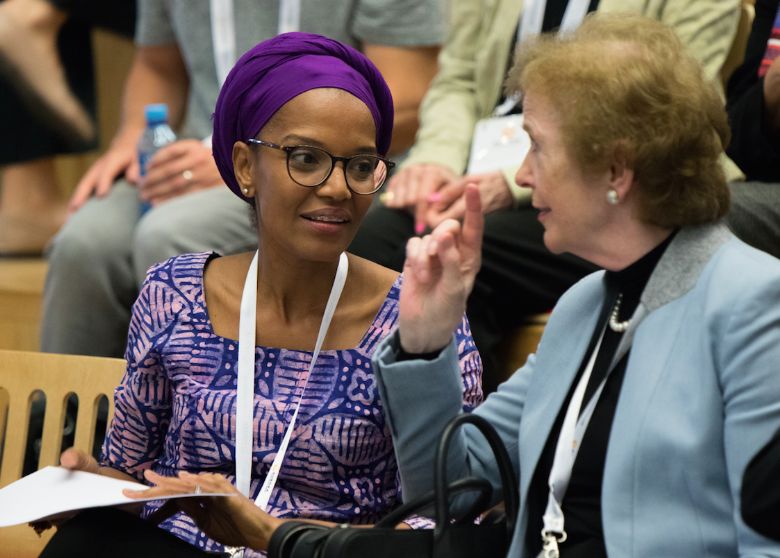Founder of Safari Doctors on "Creating Your Sweet Spot"

Umra Omar (Kenya, UWC Atlantic College 2000-2002) is the founder of Safari Doctors, a programme operating out of the coastal county of Lamu, Kenya, offering free basic medical services where there are almost none. A 2016 CNN Hero, Umra delivered a keynote speech at the 2018 awards ceremony of the Aurora Humanitarian Project for UWC Schools and Colleges, addressing an audience of world-renowned humanitarians, entrepreneurs and UWC students working for change.
For inspiration and advice on how to choose the path that is best for you, and how to achieve your humanitarian goals, read an abridged version of Umra's speech below.
In my very first days at UWC Atlantic College, we took a trip to a supermarket. Right next to the vegetable aisle, I found the junk food lane, and the most enormous chocolate chip cookies I had ever seen in my life. Next to them were these glorious jam-filled doughnuts, mercilessly sprinkled in sugar. As mouth-watering as the situation seemed, it was rather mind-boggling. Perhaps one of the most philosophical moments I had had in my teenage life - to buy or not to buy. There was no mama or baba to give an unsolicited opinion. I had to balance my own small pocketbook. I had also been warned of the freshman eight kilos to be gained. I happily chose a chocolate chip cookie - and still remember it.
The moral of this horrible example is the power of a "sweet spot" – how do we create this “chocolate chip cookie feeling” in the work that we do? For me, that sweet spot is knowing that the work that we do at Safari Doctors is grounded on being neutral, impartial and independent as we travel into communities that other institutions, including the government, fear – and we are guided by compassion and hope for humanity.
We navigate difficult passages as we sail around the Lamu Archipelago for three to four days and cross dangerous terrain visiting about a dozen villages, mobilising medics and delivering medicines to up to 1000 patients in a month – including donkeys, cats and dogs (we have a vet program on board as well). We operate between the presence of Kenyan military forces and the militant group Al-Shabaab along the corridor to reach six villages of the 12 we serve. In addition to outreach clinics, we have a youth health ambassador program with a cohort of 30 young men and women that work with their communities on health education and we are now about to roll out an advocacy initiative to strengthen community participation in civic processes for health accountability.
Now that you know a bit about Safari Doctors, let’s get back to the idea of a sweet spot and embracing the importance of humanitarian values in the work that we do.
According to my best friend (Wikipedia), the sweet spot is "a place where a combination of factors results in a maximum response for a given amount of effort." This is a term used across various fields. For example, in many sports, the sweet spot is the point where the ball that is being struck absorbs the greatest force from the racquet or bat. To audiophiles and sound  engineers, this is where all wave fronts arrive at the same time – where the listener can hear the audio mix the way the mixer wanted you to hear it. In economics, this is the point where an indicator or policy provides the optimal balance of costs and benefits. I still have no idea what that means.
engineers, this is where all wave fronts arrive at the same time – where the listener can hear the audio mix the way the mixer wanted you to hear it. In economics, this is the point where an indicator or policy provides the optimal balance of costs and benefits. I still have no idea what that means.
My favourite version of the sweet spot is this diagram by Eric Feng that applies to the careers that we seek out as we embark on this journey called life. The sweet spot is your calling. It is that intersection where our personality, life experience and passions become of service to humanity.
- FIND COMFORT IN DISCOMFORT
What Safari Doctors is doing is not new. There used to be an organisation carrying out this same work six years ago. However, the security landscape in Lamu took a major hit when a couple of kidnappings occurred in 2011 and terror attacks came to the forefront in 2014, causing many foreign-affiliated initiatives to pull out of the area. And that is when we ended up diving in. We are not the first to take such a risk, and definitely won’t be the last.
We are operating in a world that is loaded with information bias, leading to a delusional understanding of our world. For example, while the majority of refugees are hosted by countries like Turkey, Lebanon and my beloved Kenya, the English voted for Brexit out of fear of the “other”. Terrorism and war are still perceived as tremendous threats, and yet 2018 has been deadlier for young American students than for deployed military service members, due to gun violence. Where is the truth?
Our job is to step out of our comfort zone and be the truth. Be neutral, impartial and independent in your thoughts. Instead of scrolling through the likes and clicking another thumbs up, click on the profile pages of the comments that you do not like, ask why, and let your work start from there.
A UWC education gives us the tools and networks to navigate this so-called uncomfortable terrain in order to fulfil a purpose beyond the self.
- UNAPOLOGETICALLY TRUST IN YOURSELF SO THAT YOUR WORLD MAY TRUST IN YOU
Before you can make any difference in your world, you first have to gain trust. Again, according to Wikipedia, trust is the firm belief in the reliability, truth, or ability of someone or something. We are trained and conditioned to place our trust in something or someone else. To have no doubt in what God has to offer, to rely on the SATs to determine our readiness for university - we trust the world to determine who we are. My question to you now is: how much do you trust yourself?
A few months ago in one of our outreach clinics, I lost faith in our plan to improve women’s access to sustainable menstrual health products. To address women’s request for sustainable sanitary products during prior clinics, we received a donation of menstrual cups and diligently translated the materials, downloaded demonstration videos, and sat under trees with dozens of women explaining how menstrual cups were the answer to their prayers. Menstrual cups replace pads and tampons, they’re easy to use, they can be used for 12 hours, and they last 10 years. At the end of our training session - which was more a lecture than anything - only three women expressed interest. Only three trusted us - why?

During our next clinic I walked up to one of the mothers, Esha – she seemed like the most vocal one of the bunch. I whispered in her ear. “I have a little secret that I must share with the women here.” With nothing to lose since the queue was so long anyway, and the sun so hot, she gathered ten other women and we went over to her little hut. I warned them, as I am warning you now, that I needed to pull my pants down. With all the confidence, certainty and conviction in the world, I took a deep breath and popped out the menstrual cup that I had on. This was followed by perhaps the most profound discussion that I have ever had about women’s health - a connection beyond the manuals and video demonstrations that we resorted to before, a moment of raw trust and an answer to the seven years of a lifetime in bleeding that an average woman goes through. Before handing anything out, I cautioned that I would not give out this valuable artefact if it would just end up being used as a door-stopper or toy – “give me one good reason that I should leave this with you.” One of the ladies stood up, and wrapping her kanga back into position said: “because we trust you, Umra. We just saw how it works for you, it better work for us as well because we need it even more than you do!” Every single one of them walked out overjoyed with her new menstrual cup.
- COMPASSION
I get asked a lot why I do what I do. Why do I go on the road with my committed colleagues, with kids back at home and the threat of landmines? What makes one trade in a promising jet-setting career in the skyscrapers of Nairobi and New York for unpredictable nights on the road and on sea?
Growing up in Nairobi, our house served as a transit corridor for all family (and strangers) who came to the city. Some stayed for two days on their way out of the country, another for two months for a kidney transplant, and one stranger for 7 years while she completed a medical degree. In opening our home in this way, my parents engraved in the souls of their three daughters that “to whom much is given, much is expected” - that we are the keepers of our tribe.
What UWC has done for me is given this tribe a whole new meaning – stretched it beyond elastic possibilities.
While attending UWC Atlantic College, the borders of the world diffused into interwoven heartbeats and dreams. South Korea and Argentina became one through my second-year roomie Vanessa – at first it was freaky seeing this ever-smiling phenotypically Asian girl dancing to salsa and speaking in Spanish loaded with dulce de leche by the bedside drawer. The Rwandan genocide was no longer a flashback to headlines that I saw in the confines of our living room growing up in Nairobi, it was Patrick’s reality – the only guy that could call home then without my father getting all worked up, because already by that age, Patrick possessed such astounding wisdom and calmness having gone through more than I ever will in my lifetime.
One of the most profound experiences for me (other than my Peace and Conflict Studies class with Pelham Lindfield Roberts) was the Go Make a Difference programme. Thanks to Colin Habgood and his wife Jill Longson (UWC Atlantic College 1979-1981), who strongly believe in the power of young people making a difference, I was awarded a grant to return home and implement an AIDS awareness campaign that I had developed. Today, here I am running around doing the same exact thing, promoting access to healthcare.
The UWC “bug” to make a difference has long-term side effects. May these side effects turn you into warriors of justice.
I want to finish off by sharing with you my little mini-UWC in Lamu, “Shamba la Shela.” I had a problem with the authoritarianism and dearth of creativity in my early childhood education, and subjecting my two children to the same would have been unfair. Faced with a lack of school options, I was forced to start one – one where my children would connect with fellow kids from diverse backgrounds, where picking up litter, planting herbs, learning to build a home, washing dishes, yoga and dancing would be as important as their ABCs and 123s. At Shamba la Shela, we are committed that from a very young age, our boys and girls can embody humanitarian values as they build together, eat from the same plate, and learn the national anthems of the world, not just their own.
When I asked some UWC students what they were wanted from life, they expressed concern about how to plug back into the world after their UWC experience so as not to stand out too much as an idealist in a harsh world. My unsolicited advice to that would be – don’t even think about it, don’t bother. As I said, unapologetically trust in yourself so that the world may do the same. You would be surprised at how much the world needs a glimpse of your ideals.
Our work is to ride on the wave of hope and develop our unique piece of the puzzle so that the bigger picture can take shape. As a UWCer, give yourself credit: because UWC does not change who you are, but rather it reveals what you are made of. Never opt to blend in when you are designed to stand out.
We are here today because we value souls over sales. We seek to dissect facts instead of just making pacts. We vow not to be the club of the mighty, but to serve as the shield of those in need!
I wish you purposeful and rewarding restlessness in creating your sweet spot – finding that something that you really love, that you do better than anyone else and what serves humanity. May you find that chocolate chip cookie in your own world - and remember that it is your commitment to the UWC values that will make tomorrow’s world a better place.
